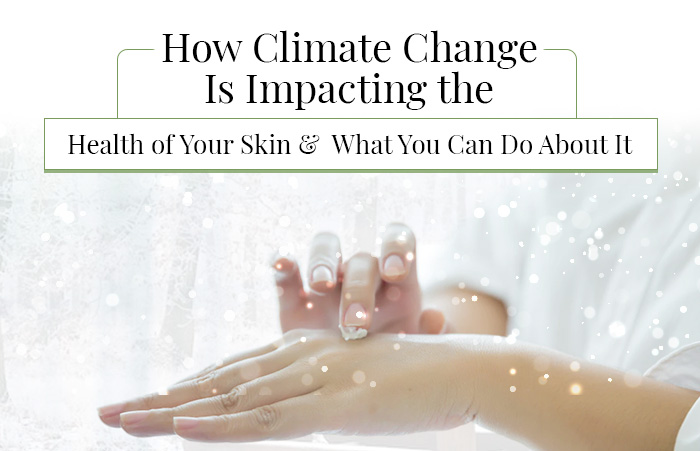Climate Change and Your Skin’s Health
As predicted, climate change is causing massive global issues, influencing weather patterns, spurring natural disasters, and overall human health. Environmental experts are noting increased rates of asthma, heat strokes, and forms of cancer among individuals. But even dermatologists are now seeing just how pervasive climate change can be.
Human skin interacts with the environment. It’s the body’s first layer of protection against the elements, serves to ward away disease, regulate temperature, and allow us to sense the outside world. And unfortunately, even the largest organ in the human body is being impacted by climate change.
Below, we’ll explore this topic in further detail and discuss what you can do to minimize the effects of climate change on your skin.
The Impact of Climate Change on Your Skin
While it may go unnoticed by many of us, there are many ways skin can be affected by the environment. From dermatological conditions to infectious diseases, our world influences our health. Let’s take a look at how climate change is impacting your skin’s overall health:
• Extreme Weather
• Ozone Layer Depletion
• Flooding
• Increased Temperatures
• Increased Pollen Production
Simple factors like these can significantly affect how your skin looks and feels. They can even promote or worsen conditions such as:
• Skin Cancer
• Acne
• Eczema
• Rashes
• Fungal Issues
Climate Change and Skin Cancer
Currently, it’s estimated that one in five individuals will have skin cancer at some point in their lives. And unfortunately, climate change is already affecting these numbers, with UV rays being a major contributor. UV exposure is a common factor in developing skin cancers such as squamous and basal cell carcinomas and melanoma.
Our ozone layer, a protective layer of the atmosphere, has experienced significant damage over the years thanks to pollution, chlorofluorocarbons (CFCs), and contaminants in the air. Despite the condition of the ozone layer improving in the 21st century, the effects of the damage are still being seen today. In fact, according to research conducted in 2016, a single percent change in the ozone layer’s effectiveness increases the prevalence of squamous cell carcinoma from 3-4%, basal cell carcinoma from 3 to 4.6%, and melanoma from 1 to 2% worldwide.
Climate Change and Acne
Acne, another common skin condition, is also seeing a notable increase thanks to several factors brought on by climate change. Changes in the environment, whether it’s an increase in temperature, humidity, or air quality, can influence the health of our skin. For example, it can alter your skin’s pH balance, increase sweating and oil production, and increase breakouts.
Additionally, air pollution can increase oxidative stress, speeding up aging and allowing wrinkles and lines to form prematurely.
Climate Change and Other Skin Conditions
It’s not just cancer and acne that are influenced by changes in our climate. Many other skin conditions, diseases, and issues can fluctuate or worsen based on environmental concerns like pollutants, chemicals, and increased UV exposure.
Higher temperatures, increased humidity, and air quality can promote excess sweating, allowing present skin issues to flare up or return. This is especially true of those that suffer from skin conditions like eczema, psoriasis, and rosacea.
In fact, some studies show evidence of eczema cases increasing in urban environments, suggesting that pollution may play a significant role in cases and flare-ups.

How to Protect Your Skin from the Effects of Climate Change
Though there isn’t much a single individual can do to reverse over a century of environmental pollution, you can take several steps to minimize its effects on your skin. Let’s take a look at just a few ways individuals can reduce the impact of climate change on their skin.
1. Always Use Sunscreen
UV exposure is one of the most notable causes of skin cancers like squamous cell carcinoma, basal cell carcinoma, and melanoma. Even on cold, overcast days, you’ll want to protect your skin by wearing appropriate SPF sunscreen and minimizing exposure to the sun.
2. Check Air Quality
Keeping your eye on your region’s air quality can reduce breakouts, skin issues, and cancer risks.
3. Stay Hydrated
Our bodies are mostly comprised of water, so it makes sense that staying hydrated is incredibly important to your overall health. But it’s also essential for keeping your skin healthy and looking its best. Drink plenty of water, moisturize properly, and develop a healthy skincare routine to ensure your skin is always fully hydrated.
4. Take Vitamins and Supplements
Exceedingly high temperatures and excess sweating can flush critical nutrients from your skin. To minimize the loss of nutrients, minerals, and vitamins, develop a supplement routine. These vitamins can keep your skin healthy, energized, and feeling its best, even when the climate around you doesn’t cooperate.
5. Wear Protective Clothing and Hats
In addition to preventing UV exposure, wearing protective clothing such as long-sleeved shirts and pants can minimize skin contact with harmful airborne chemicals, pollutants, and dust.
6. Pay Attention to the Skin Care Products You Use
Some skincare products like moisturizers, lotions, and astringents contain chemicals that can exacerbate already present skin conditions. So you’ll want to research and carefully select the skincare products you use to minimize adverse effects.
7. Visit a Dermatologist Regularly
Even outside of climate change, scheduling regular appointments with a licensed dermatologist will not only ensure that you’re aware of any changes to your skin but can also help you take preventative measures to reduce the chances of future problems.
Winston Salem Dermatology Is Your Dedicated Skincare Experts
For years, Winston Salem Dermatology has prided itself on delivering real, effective results for residents of North Carolina. Our skin treatment centre specializes in a wide range of cosmetic and medical skincare procedures that can ensure that you always look- and, more importantly, feel- your best.
We’re happy to offer an extensive array of skin care treatments for issues like psoriasis, acne, eczema, rosacea, and more. From skincare products to IPL therapy, we do it all and achieve lasting results!
Additionally, Winston Salem Dermatology is proud to offer several state-of-the-art skin cancer treatment programs to help you stay on top of your skin’s health.
So, if you’ve been thinking about ways to reverse the aging process, reduce blemishes, or take control of your overall skin health, give Winston Salem Dermatology a call at (336) 774-8636. We’ll be happy to schedule an appointment and show you how we can help you to better your skin!


